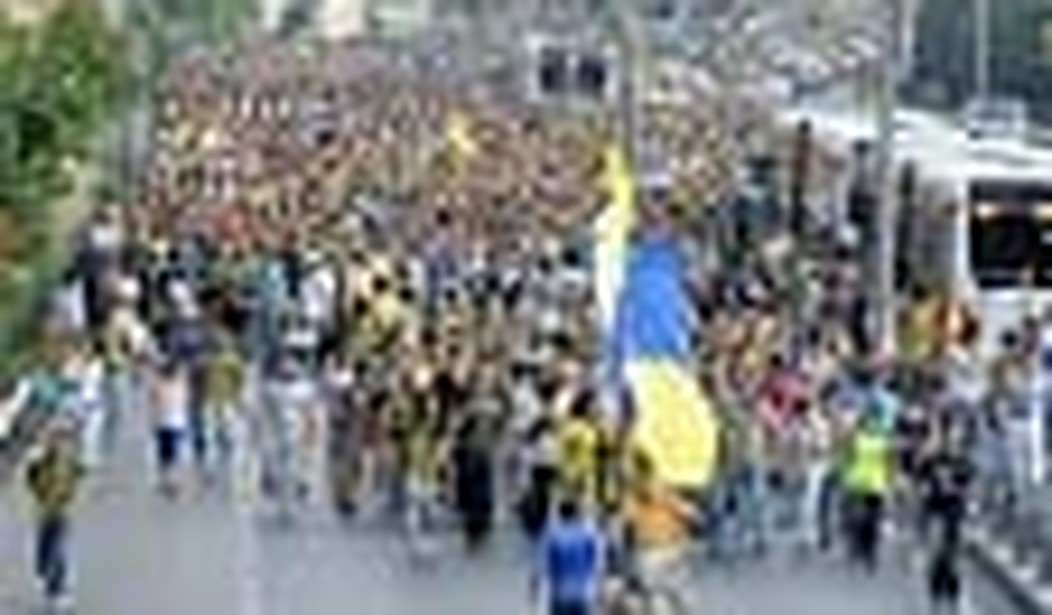Like a headlong charge in some medieval battle, Turkish soccer fans rushed at police barricades along an Istanbul expressway on July 10. The police immediately fired tear gas to disperse the crowd of more than 100,000 people who had gathered to demonstrate against the detainment of Aziz Yıldırım, president of their popular soccer club Fenerbahce, the 2010-11 Turkish champions.
To rub in the arrest, it was announced soon thereafter that Yıldırım would be jailed indefinitely as he faced trial for alleged match-fixing. The main accusation against him is “setting up an armed organized crime ring for profit,” which seems rather flimsy. Enraged fans then continued their protest outside the courthouse where Yildirim is being held.
Like something out of a Soviet bloc country rather than Turkey’s traditional democracy, the government and its supporters spoke of “an Ergenekon of soccer,” a comparison to the trumped-up case in which many hundreds have been arrested and imprisoned without trial for three years. They were charged with allegedly planning a coup. Their actual “crime” seems opposition to the current government.
One reporter for the pro-government and Islamist Today’s Zaman newspaper, Huseyin Gulerce, spoke about networks of “coupmakers” and subversive elements in soccer that would now be brought to heel. “Today, the civilian authority is calling the shots” and its enemies “are doomed to lose.” The timing of the soccer struggle coincides with the resignation of the four top military officers, another case of the government asserting itself over a key institution.
When Turkish voters approved the September 12, 2010 referendum on 26 items of constitutional change, the United States and EU hailed the results as proving “the vibrancy of Turkey’s democracy” and “a step in the right direction.”
Yet the referendum clearly violated the EU Venice Commission’s own Code of Good Practice on Referendums, which states (page 12), “There must be an intrinsic connection between the various parts of each question put to the vote, in order to guarantee the free suffrage of the voter.” Some popular reforms were blended with other changes giving the regime more power. Many voters supported the plan because of the former provisions while disliking the latter ones.
The international cheering for “democratization” goes on while generals, civic leaders, writers, and journalists have been imprisoned since the government’s July 2007 landslide election victory convinced it that it no longer needed to be cautious in asserting its hegemony. Not a single person has yet been convicted. One of the first jailed, writer Ergun Poyraz, marked his fourth anniversary in prison on July 27. Eight newly elected members of the parliament are still in jail, too.
The referendum gave Prime Minister Erdogan the ability to pick members of the high court and in some cases parliament, thus subordinating all three branches of government to himself. Thus the ultimate irony: Erdogan was granted dictatorial powers in the name of democratization. In addition, the Turkish police force, YÖK (Higher Education Board), Diyanet (Presidency of Religious Affairs), and the Turkish Central Bank among numerous other institutions are now controlled by the governing party, its cronies, and supporters.
Even the soccer industry is now being subordinated to the central government, in large part because it is extraordinarily valuable. If franchises can be given to government supporters as rewards, kick back money to the ruling party, and covertly encourage fans to support the regime’s program that would be worth a tremendous amount in political and financial power.
The fans followed up their protest by storming the field to halt a friendly match against Ukraine’s Shakhtar Donetsk eleven days after the July 10 confrontation, chanting for the government to resign, “Hükümet istifa!”
And what better symbol of Turkey’s devolution toward dictatorship than the fact that none of the media reported the demonstrators’ demand for the government to step down but mostly said it was just a protest against the match-fixing allegations.
A few days later, Turkey was again rocked, this time by the resignation of the top military commanders in protest over government policy. Contrary to the spin of pro-government and international media, including the idea that the resignations’ cause was mysterious, Chief of the General Staff Işık Koşaner made their motive perfectly clear:
Investigations and long detention times are kept on the agenda to create an image that the Turkish Armed Forces is a crime organization. Government has not made enough effort to stop it. I will not be able to continue as Chief of the General Staff as I have been impeded by this situation from protecting the rights of my staff.
It is a unique case of a military high command resigning to protest repression by a civilian government!
Needless to say, for the European Parliament’s Turkey rapporteur Ria Oomen-Ruijten, these developments only proved that “Turkey is becoming more democratic.” Unfortunately, the exact opposite is what’s happening.









Join the conversation as a VIP Member